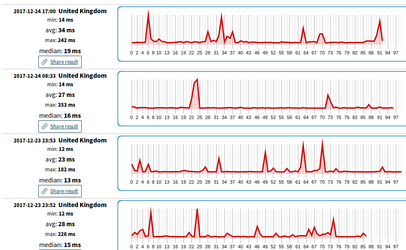Hi all,
I am trying to understand why my Internet connection keeps dropping. I am running some tests (wired) using an ethernet cable to my router (ADSL). These are my results so far. These tests have been ran over 6 hours. As you can see the results are up and down.

I thought initially this was my wifi connection, but then I ran these tests with ethernet and finding the same problem. I should be getting a max of 17mb, according to the area I live in and what the ISP said I can get (but my experience is that you always get less then this in reality).
I can cope with 11-12mb/s, but when it drops to around 1mb/s, it is just not good at all, its far too slow then.
Any Ideas what this might be and how to fix it.
Thanks
I am trying to understand why my Internet connection keeps dropping. I am running some tests (wired) using an ethernet cable to my router (ADSL). These are my results so far. These tests have been ran over 6 hours. As you can see the results are up and down.

I thought initially this was my wifi connection, but then I ran these tests with ethernet and finding the same problem. I should be getting a max of 17mb, according to the area I live in and what the ISP said I can get (but my experience is that you always get less then this in reality).
I can cope with 11-12mb/s, but when it drops to around 1mb/s, it is just not good at all, its far too slow then.
Any Ideas what this might be and how to fix it.
Thanks
